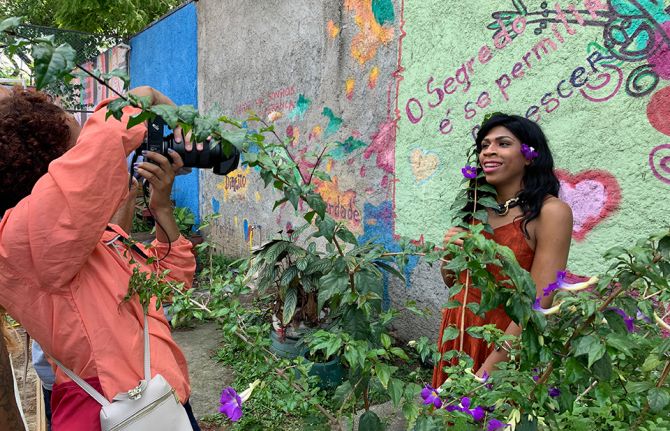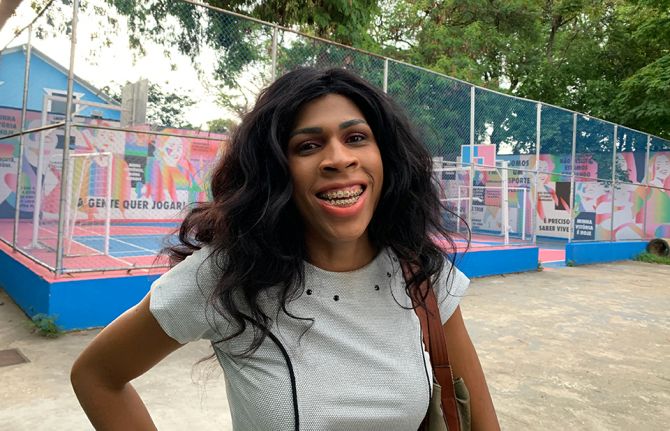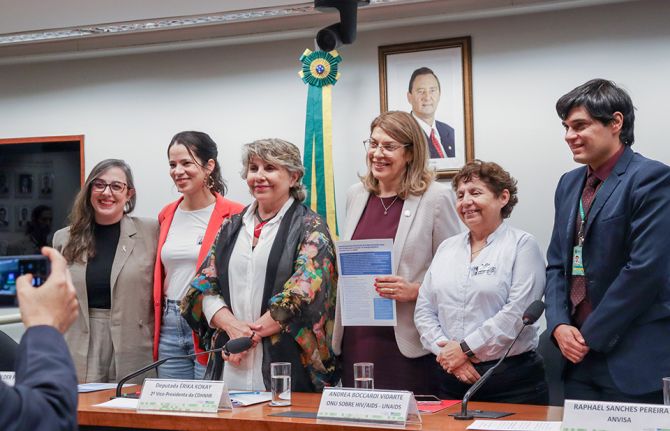



Feature Story
Helping to break stigma and discrimination against transgender people in Brazil
31 March 2022
31 March 2022 31 March 2022Una is a coastal city of just over 20 000 inhabitants in the Brazilian state of Bahia. Fourteen years ago, Rihanna Borges left her little piece of paradise behind, to arrive at a much larger metropolis: São Paulo. “I needed to be reborn as a person and have the freedom to be who I really was. I wanted to be Rihanna, this trans woman whose essence could not safely emerge in my home town.”
Her decision reflects the decisions made by many transgender people, who, at some point, need to move away from their families to live life fully. When she recognized herself as a transgender woman, she had her mother’s unspoken support and recognition, but got no support from her father, triggering conflict and rejection that brought her a lot of suffering.
“Imagine coming out in a small town, with deep conservative and sexist roots. I could suffer any kind of violence. When I left Una I knew I was not that person my father expected. I had to leave my roots and throw myself into the world, so that I could be entirely me,” said Ms Borges. She has now reconciled with her father and has, in her words, a “nice” relationship with her family.
“Stigma and discrimination steals our identity as human beings, destroying us, turning us into unimportant people, who can be abused, mistreated, violated. So, the support of our families is critical because the world outside is cruel and destructive,” she said.
Ms Borges is one of the residents of Casa Florescer, a pioneering transgender welcoming centre located in the city of São Paulo, which hosts them while providing housing and access to mental health and other health-care support. Owing to increased vulnerabilities, stigma and discrimination, inequalities and disrupted family ties, among other reasons, the transgender women served by Casa Florescer come from extremely vulnerable backgrounds, having a history of adopting, and being exposed to, higher risk behaviours, including unsafe sex and use of drugs.
In this context, UNAIDS launched in 2021 an innovative initiative, the FRESH Project, to engage transgender women in understanding combination HIV prevention, focusing on pre-exposure prophylaxis, post-exposure prophylaxis and harm reduction. Through the project, the participants are rewarded for positive behaviour change to reinforce positive behaviours and reduce their vulnerability and the impact of inequalities.
The first initiative of the FRESH Project in Brazil saw the voluntary participation of 22 of the 30 transgender women residents of the Casa Florescer, including Ms Borges.
The participants were trained in photography in sessions promoted by the American photographer Sean Black, who specializes in portraying lesbian, gay, bisexual, transgender and intersex people, especially people living with HIV. During the sessions, the participants reflected on their daily lives through their photographs.
“It was incredible to realize, over the days, how many of the women had a very negative opinion of themselves, reflecting the stigma they suffer from society. They discovered themselves as the beautiful and unique people they are and understood how fundamental it is to take care of themselves,” said Mr Black. “The photographs that I took, and the ones that they also took, reveal the essence of each one of them and how they are people who dream and want to be happy, like everyone else,” he added.
Ariadne Ribeiro Ferreira, the UNAIDS Brazil Community, Gender and Human Rights Officer, who is a transgender woman, highlighted that one of the objectives of the FRESH Project was to show that transgender sisterhood also means strengthening the path of self-respect, self-love and self-care. “Stigma and discrimination, associated with society’s punitive logic, only increases the social abyss that the most vulnerable groups are forced to face. Therefore, positive reinforcement, in this case represented by photographic art, is transformative and a path to a process of personal and collective change.”
“When I saw my photos after the photography sessions, I realized how powerful is to show our essence, the beauty that each one of us has. I felt it strengthened in me the certainty of how important it is, first of all, that we take care of ourselves, love ourselves, in order to pass this love on to other people and face stigma and discrimination,” said Ms Borges.



